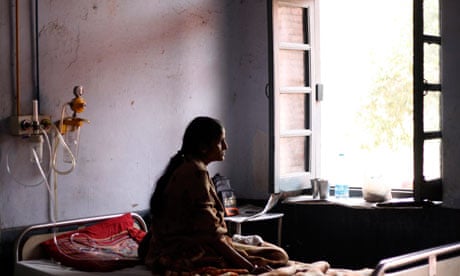For the past nine months, I have been experiencing first-hand the challenges of treating drug-resistant tuberculosis, a highly infectious disease that's fatal without treatment and extremely difficult to cure. I'm volunteering as a doctor for Médecins Sans Frontières/Doctors Without Borders (MSF) in Karakalpakstan, Uzbekistan, an area where drug-resistant TB is endemic. Here, I have witnessed treatment side effects ranging from rashes to liver failure – but one of the most unexpected and dangerous is depression.
It's not underlying mental illness that causes people on TB drugs to become depressed. It's a chemical effect resulting from the ingestion of cycloserine, one of the cocktail of drugs we must use to treat drug-resistant TB. Cycloserine has the potential to precipitate depression, psychosis and suicidal thoughts in patients. Over the past month, five of our patients have attempted to take their own lives. Each case of drug-resistant TB therefore presents our team with a dilemma: we must try to reconcile the conflict between saving the patient from dying from TB, and our ethical concerns about the side effects of the treatment.
Recently, my patient Maya rang one of MSF's trained counsellors and told them she was going to kill herself. We immediately assembled a 'crisis' team, which arrived just in time to find Maya climbing onto a chair placed under a beam in her front room.
With no effective psychiatric care available, we had limited options. We talked Maya down, stopped her TB drugs, put her on the best anti-depressant we had available and admitted her to the safest place we could: our TB ward, with round-the-clock, albeit not psychiatrically trained, nursing staff.
Maya is an orphan with a tragic life story that has left her vulnerable and isolated in her community. With her personal history, I had known she was high risk for cycloserine from the start, as it appears that patients with psychological issues are most vulnerable to cycloserine's dirty tricks. From my experience, the psychiatric effect of cycloserine does not display itself with typical signs and symptoms of depression. Instead, it is as if the drug pops harmful thoughts into the heads of unsuspecting patients, who then feel overwhelmingly compelled to act on them. And then, like a bad dream, within days of stopping cycloserine and starting an anti-depressant, these feelings seem to evaporate.
I had warned Maya that she might experience strange and disturbing thoughts, and to let us know if she did so. Yet by the time I first met her, she was already dying of TB and had exhausted all other treatment options. I feared that without cycloserine, her TB regimen would be too weak, and ultimately ineffective.
Though cycloserine is primarily to blame, there can be no denying that other things contribute to episodes like Maya's. The stigma of being a TB patient, a patient's pill burden (the number of drugs they have to take on a daily basis) and the duration of the treatment often feel like a prison sentence. And the possibility that such suffering may be in vain, that the treatment may fail despite all our best efforts, hangs like a noose over every patient every second of every day.
Maya's suicide attempt and the emotions and thoughts that precede it, mirror some of the emotions that come with the job. On that fateful day feelings of relief that we had got there in time and panic at how close she'd been to the end, flooded me simultaneously. As a responsible doctor, I try to maintain a calm air of authority, but I am often keenly aware that I am actively trying to suppress and conceal my own stress. Working in such desperate situations triggers a rollercoaster of emotions and, when working in a region where only a handful of us hold internationally recognised medical qualifications, the feeling of responsibility is a heavy burden to carry.
The morning after, Maya asked me when she could start taking her TB drugs again because she had been enjoying no longer having a cough. Once again, I'm forced to acknowledge that the tools we currently have against drug-resistant TB are, at best, just a holding measure and not a solution. We need the pharmaceutical industry and the international community to put this disease on their agenda and give doctors and patients what they so desperately need: new compounds against drug-resistant TB.
This burden of responsibility should not weigh on my shoulders, but on theirs.
Emily Wise is a British specialist registrar in infectious diseases, working with MSF on tuberculosis projects in Uzbekistan. She's blogs about here experiences here.
Editors note: To write for us about your experience as a development professional, drop us an email to globaldevpros@theguardian.com
Names have been changed to protect anonymity
This content is brought to you by Guardian Professional. To get more articles like this direct to your inbox, sign up free to become a member of the Global Development Professionals Network

Comments (…)
Sign in or create your Guardian account to join the discussion